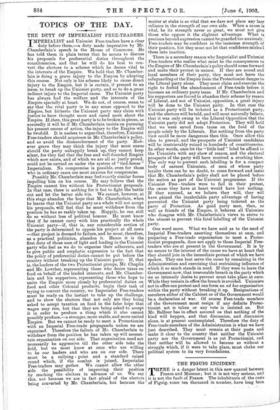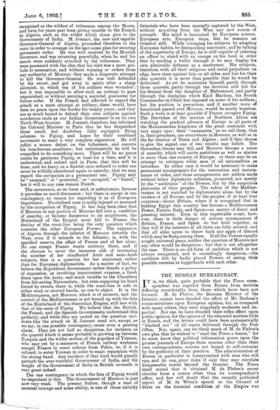THE FIGUIG INCIDENT.
THERE is a danger latent in this new quarrel between France and Morocco ; but it is not-very serious, and it is not the fault of France. The inhabitants of. the oasis of Figuig, some ten thousand in number, have long been recognised as the wildest of tribesmen among the Moors, and have for years past been giving trouble to the French in Algeria, such as the wilder Afridi clans give to the Government of India. M. Jonnart, the new and capable Governor-General of Algeria, proceeded therefore to the oasis in order to arrange on the spot some plan for securing permanent order. He was well received by the Moorish Governor, and was returning peacefully, when he and his escort were suddenly attacked by the tribesmen. They were possessed with the idea that his visit was a mere pre- lude to annexation, and without warning or orders from any authority of Morocco they made a desperate attempt to kill the Governor-General He was well defended by his escort, and got away in safety after a sharp skirmish, in which ten of his soldiers were wounded ; but it was impossible to allow such an outrage to pass unpunished, or without securing a material guarantee for future order. If the French had affected to regard the attack as a mere attempt at robbery, there would have been no peace upon the border for twenty years ; and they are as much bound to defend their own subjects against murderous raids as our Indian Government is on its own North-West frontier. M. Jonnart, therefore, has informed the Colonial Minister in Paris that he has despatched three small, but doubtless fully equipped, flying columns to Figuig, and hopes by their combined movement to exact a very complete reparation. He will inflict a severe defeat on the tribesmen, and execute his treacherous assailants ; but unfortunately he will be compelled to do something more. There will-be no peace unless he garrisons Figuig, at least for a time, and it is understood, and indeed said in Paris, that this will be done; and we fancy, as a district once reduced to order can never be wilfully abandoned again to anarchy, that we may regard the occupation as a permanent one. Figuig may be " annexed," or " protected," or " occupied," or " leased,'" but it will in any case remain French.
The occurrence, as we have said, is unfortunate, because it-provokes so much discussion ; but there is, except in one contingency,• no reason for regarding it as of European importance. No civilised man is really injured or menaced by the occupation of Figuig. It has long been clear that if Morocco or any portion of Morocco fell into a condition of anarchy, or became dangerous to its neighbours, the Hinterland of the Empire must fall to France, the destiny of the coast-line being the only question which concerns the other European Powers. The expansion of Algeria through the interior of Morocco towards the West, even if it extends to the Atlantic, is, with the specified reserve, the affair of France and of her alone. N.o one. except France wants territory there, and if she chooses to incur the immense risk of increasing the number of her disaffected Arab and semi-Arab subjects, that is a question for her statesmen rather than for European diplomatists. As a matter of fact, we believe the. Republican Government rather dreads a policy of expansion, as involving inconvenient expense, a fresh drain upon the Army, and much trouble in the Chambers from fire-eating Nationalists ; but even supposing its hand forced by events, there is, while the coast-line is safe in either weak or neutral hands, no one to object. It is the Mediterranean, not Morocco, which is of moment, and the control of the Mediterranean is not bound up with the fate of the Hinterland of the Shereefian Empire, still less with that of the oasis of Figuig. We believe that the British, the French, and the Spanish Governments understand this perfectly, and while they are united on the question inci- dents.like the attack on M. Jonnart need not, except, as we say, in one possible contingency, cause even a passing alarm. They are not half so dangerous, for instance, as the quarrel which it seems probable is growing up between Tonquin and the wilder section of the populace of Yunnan, who may yet by a massacre of French railway workmen compel France to exact redress from Pekin, or, if it is refused, to enter Yunnan in order to exact reparation with the strong hand. Any incident of that kind would greatly perturb the ever-watchful Government of India, and the weight of the Governinent of India in British counsels is very great indeed.
The one contingency in which the fate of Figuig would be important is this. The Government of Morocco is just now very weak. - The present Sultan, though a man of unusual courage and some ability, is one of those unlucky Orientals who have been mentally captured by the West, without acquiring from the West any new source of strength. His mind is fascinated by European science, European arts, European ways, but he remains an Oriental still. While outraging his subjects by adopting European habits, by disregarding sanctuary, and by talking of the superiority of Europe, he is still capable of ordering an officer to stand with an orange on his head in order that by sending a bullet through it he may display hie own admirable deftness as a marksman. His subjects, therefore, with all their religious and racial prejudices on edge, have risen against him on all sides, and but for their clan quarrels it is more than possible that he would be dethroned. As yet he maintains himself, partly through those quarrels, partly through the devotion still felt for his descent from the daughter of Mahommed, and partly through the discipline which Said Maclean, his Scotch Commander-in-Chief, has imposed on some of his soldiers ; but his position is precarious, and if another wave of fanaticism passed over Morocco, would be nearly hopeless. Such a. wave is at least possible if France occupies Figuig. The Dervishes of the interior of Northern Africa are watching the gradual advance of Europe in all parts of the Mahommedan kingdoms of the great continent with very angry eyes ; their " emissaries," as we call them, that is, their preachers, are everywhere in Morocco, as well as in the far interior of Tunis and Algiers ; and if they choose to give the signal, one of two results may follow. The Shereefian throne may fall, and Morocco become a scene of anarchy, which will excite ambitions as well as alarms in more than one country of Europe ; or there may be an attempt to extirpate white men of all nationalities as intruders. In either case it would be necessary to make permanent arrangements for the restoration and mainte- nance of order, and these arrangements are seldom made without bitter diplomatic collisions, promoted, not merely by the " ambitions " of the Powers, but by the suspicious jealousies of their peoples. The safety of the Mediter- ranean is not watched by diplomatists alone, but by the traders of all Europe, and by the peoples of at least four countries—Great Britain, where it is recognised that in holding Egypt this country has become a Mediterranean Power, France, Italy, and Spain—as matter of direct and pressing interest. Even in this regrettable event, how- ever, there is little danger of serious consequences if Britain, France, and Spain do but hold together, as they will if the interests of all three are fully secured, and they all alike agree to throw back any apple of discord which may be flung among them. If all the Powers equally sought universal peace, neither the question of Morocco nor any other would be dangerous ; but that is not altogether the case. There is an old form of ambition which is not always recognised, and is exceedingly dangerous,—the ambition felt by badly placed Powers of seeing their possible enemies at loggerheads with each other.











































 Previous page
Previous page